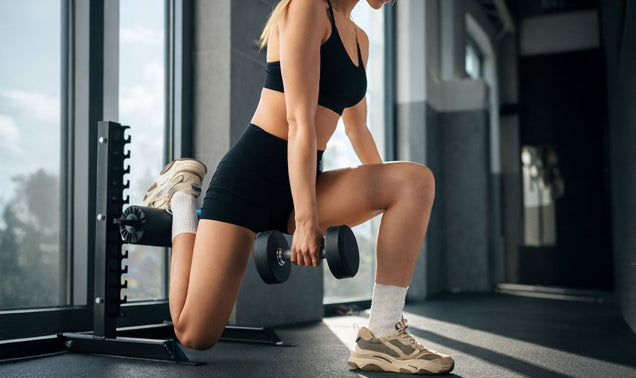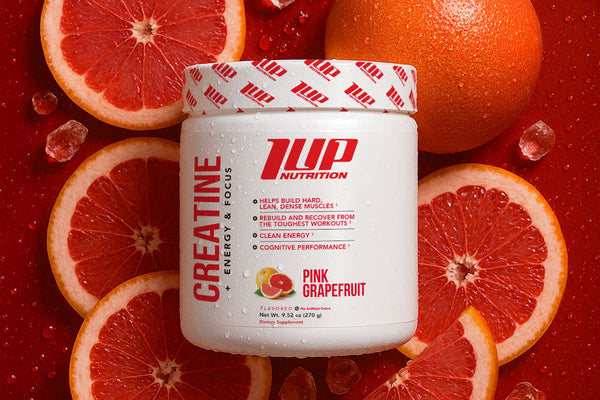Supplements come in and out of vogue each year, but one supplement continues to rank among the most popular - creatine.
Traditionally, the supplement has been more popular among men as it improves sports performance and muscle growth, but recent trends indicate a significant shift. An increasing number of women are now incorporating creatine into their fitness regimes, and for good reason.
A growing body of evidence finds that creatine also offers benefits for women!
Today, we’ll explore the benefits of creatine for muscle growth, how women stand to gain from it, and address some common misconceptions.
What is Creatine?
Creatine is a naturally occurring compound found in small amounts in certain foods, including red meat, poultry, and fish. It’s also synthesized in our bodies where it plays a crucial role in the production of adenosine triphosphate (ATP) -- the cellular currency of energy production.
Our muscles only store enough ATP for a few seconds of high-performance output. After those ATP stores are depleted, the body then turns to glycogen (stored glucose) and fatty acids to burn and produce more ATP.
Supplementing with creatine increases creatine phosphate stores in muscle cells, which helps rapidly replenish ATP and enable you to perform at a higher level for longer before fatiguing.
Why Supplement with Creatine
While our bodies naturally produce creatine, it is only in limited amounts (~1-2 grams of creatine per day). You can get creatine from animal protein; however, you’d need to consume upwards of 3-4 pounds of meat/fish each day to achieve 5 grams of creatine.
Something else worth mentioning is that women exhibit 70–80% lower endogenous creatine stores compared to men.[1] The good news is that creatine is one of the most affordable supplements on the market, especially when you consider the cost of eating 3-4 pounds of meat per day!
Now, let’s get to the benefits of creatine.
Benefits of Creatine Supplementation (for Women & Men)
Despite over 50 years of research, the benefits of creatine continue to grow:
Increased Exercise Performance
The vast majority of research conducted to date has been in the area of sports performance. Time and time again, creatine has shown to boost performance (for men AND women) across a wide range of exercises and athletic endeavors, including[2,3]:
- Resistance training
- Sprinting
- Interval training
- Boxing/Martial arts
- Rowing
- Cross-country skiing
- Mountain biking
- Cycling
- Triathlon
Over the long term, this leads to better workouts, more calories burned, and superior results compared to not supplementing with creatine!
Lean Muscle & Strength
Building muscle and strength demands progressive overload -- challenging your muscles and nervous system to lift more weight for more reps over the course of your training career.
Supplementing with creatine helps improve repetitions completed, strength, and power output. Over weeks, months, and years of training, this helps individuals build more strength and lean muscle.[3,4]
Among pre-menopausal women, creatine appears to be effective for improving strength and exercise performance. Post-menopausal females may also experience benefits in skeletal muscle size and function when consuming “high” doses of creatine (10-20 grams per day).[1]
Supports Bone Health
Osteoporosis is a silent, progressive disease that typically affects women more than men and increases the risk of bone breaks and fractures.[5] Creatine supplementation has been found to have favorable effects on bone health when combined with resistance training.
Boosts Mood & Cognition
Creatine increases cerebral phosphocreatine and brain bioenergetics by influencing high-energy phosphate metabolism, which results in increased ATP levels.[1,6] This is a fancy way of saying that the brain is an energy-hungry organ, and supplementing with creatine can help brain cells meet energy demands by increasing their energy reserves.
Pre-clinical and clinical studies also suggest beneficial effects from creatine supplementation on mood and cognition, possibly by restoring brain energy levels and homeostasis. What’s more, creatine supplementation may be even more effective for females by supporting a pro-energetic environment in the brain.[1]
Enhanced Recovery
For women, who may face unique recovery challenges related to hormonal cycles and stress, creatine can help reduce muscle damage following intense workouts, leading to quicker recovery times and less muscle soreness (DOMS).[7,8]
Breaking Down the Myths
Though research continues to highlight the safety and efficacy of creatine, there are still a number of myths that plague the valuable supplement and cause many individuals to miss out on the benefits of creatine.
Despite its popularity among bodybuilders and high-end athletes, creatine is NOT a steroid, and it does not make you “bulky.”
Creatine does help store extra water in your muscles, which aids hydration, muscle shape, and fatigue resistance. But it does not make you bloated.
Creatine also does not cause you to lose your hair.
You may notice a slight increase in body weight during the first couple of weeks using creatine, but this is entirely normal as your muscle cells are becoming more hydrated. This ultimately helps you to train better and reduce the rate of fatigue setting in during your workout. Ultimately, by supporting higher intensity workouts, creatine can help you achieve better muscle definition and improve overall body composition.
How to Use Creatine
While a “loading phase” has been popular for creatine, the truth is that it is not necessary for most individuals. Simply take 3-5 grams per day every day, and your muscles will be saturated with 3-4 weeks. Now, if you are a competitive athlete, such as a powerlifter, then you may want to use a loading phase so your muscles get saturated more quickly, but for the vast majority of us, 3-5 grams per day gets the job done.
As for the “best” time to take creatine, some research shows it’s better taken post-workout compared to pre workout. However, the most important thing is to take it consistently (i.e. daily). If this means taking it post workout, great! If that means taking it first thing in the morning with your breakfast smoothie, that’s great too!
The Best Creatine Supplement
There are many forms of creatine on the market, but none can match the amount of safety and performance data of creatine monohydrate -- the king of creatine!
1UP offers not one but FOUR different ways to help you meet your creatine needs (depending on what your goals are):
- Post-Workout: 1UP Pure Rebuild combines 5g creatine monohydrate alongside advanced recovery agents, including electrolytes, L-Glutamine, EAAs/BCAAs, and Betaine anhydrous to accelerate muscle recovery and results.
- Body Recomposition: Creatine Tone + Define packs 5g creatine monohydrate alongside HMB and CaloriBurn GP. These last two ingredients help retain lean muscle and boost metabolism during periods of calorie restriction (aka dieting).
- Increased Hydration: Creatine + Hydration supplies key electrolytes from Pink Himalayan Salt along with magnesium and potassium so you can stay hydrated and fueled no matter where life takes you.
- Greater Focus & Productivity: Creatine + Energy & Focus gives you the boost you need to get more done at work, in the classroom, and in the gym by combining creatine monohydrate, natural caffeine (from green coffee beans) and Cognizin, which contains choline -- an essential nutrient for memory, learning, and focus.
References
- Smith-Ryan AE, Cabre HE, Eckerson JM, Candow DG. Creatine Supplementation in Women's Health: A Lifespan Perspective. Nutrients. 2021 Mar 8;13(3):877. doi: 10.3390/nu13030877. PMID: 33800439; PMCID: PMC7998865.
- Forbes SC, Candow DG, Neto JHF, Kennedy MD, Forbes JL, Machado M, Bustillo E, Gomez-Lopez J, Zapata A, Antonio J. Creatine supplementation and endurance performance: surges and sprints to win the race. J Int Soc Sports Nutr. 2023 Dec;20(1):2204071. doi: 10.1080/15502783.2023.2204071. PMID: 37096381; PMCID: PMC10132248.
- Kreider, R.B., Kalman, D.S., Antonio, J. et al. International Society of Sports Nutrition position stand: safety and efficacy of creatine supplementation in exercise, sport, and medicine. J Int Soc Sports Nutr 14, 18 (2017). https://doi.org/10.1186/s12970-017-0173-z
- Wu SH, Chen KL, Hsu C, Chen HC, Chen JY, Yu SY, Shiu YJ. Creatine Supplementation for Muscle Growth: A Scoping Review of Randomized Clinical Trials from 2012 to 2021. Nutrients. 2022 Mar 16;14(6):1255. doi: 10.3390/nu14061255. PMID: 35334912; PMCID: PMC8949037
- Keen MU, Barnett MJ, Anastasopoulou C. Osteoporosis in Females. [Updated 2025 Jun 29]. In: StatPearls [Internet]. Treasure Island (FL): StatPearls Publishing; 2025 Jan-. Available from: https://www.ncbi.nlm.nih.gov/books/NBK559156/
- Gordji-Nejad, A., Matusch, A., Kleedörfer, S. et al. Single dose creatine improves cognitive performance and induces changes in cerebral high energy phosphates during sleep deprivation. Sci Rep 14, 4937 (2024). https://doi.org/10.1038/s41598-024-54249-9
- Cooke, M.B., Rybalka, E., Williams, A.D. et al. Creatine supplementation enhances muscle force recovery after eccentrically-induced muscle damage in healthy individuals. J Int Soc Sports Nutr 6, 13 (2009). https://doi.org/10.1186/1550-2783-6-13






